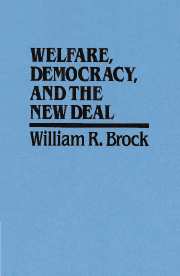4 - Federal relief
Published online by Cambridge University Press: 07 December 2009
Summary
There was no serious discussion of federal aid before the winter of 1930–1. In Congress ten bills, of which the majority favored federal grants for relief in the worst hit areas, to be administered by the Red Cross (following the precedent of federal aid for victims of drought, earthquakes, or other disasters), sank without a trace. In the unlikely event that a bill of this type passed Congress, it faced a certain veto. Hoover did not rule out the possibility of federal aid in the last resort, but the reports reaching the POUR were almost unanimous in claiming that states and localities could get through on their own resources.
Men and women in close touch with relief work in the cities moved more rapidly to welcome outside help. The reaction of the more cautious among them is evident in speeches made to the National Conference of Social Work in 1930 and 1931 by C. M. Bookman, director of social agencies and of the Community Chest in Cincinnati. In 1930 he gave an account of the work of private charities in the city and stressed the importance of voluntary action, provided that it was well organized. A year later his concern was with the limitations of voluntary effort. In Cincinnati about one-third of the unemployed were by then dependent on relief and absorbing all the resources and energies of the agencies.
- Type
- Chapter
- Information
- Welfare, Democracy and the New Deal , pp. 127 - 170Publisher: Cambridge University PressPrint publication year: 1988



